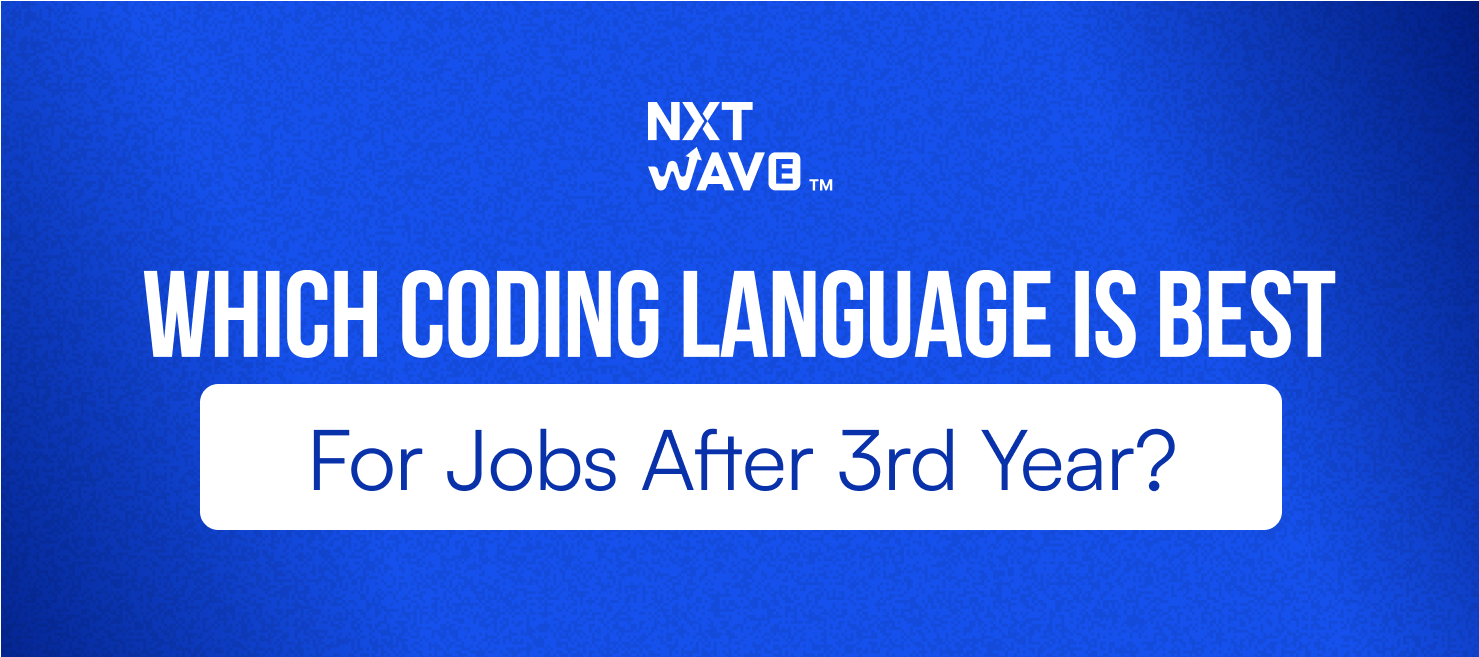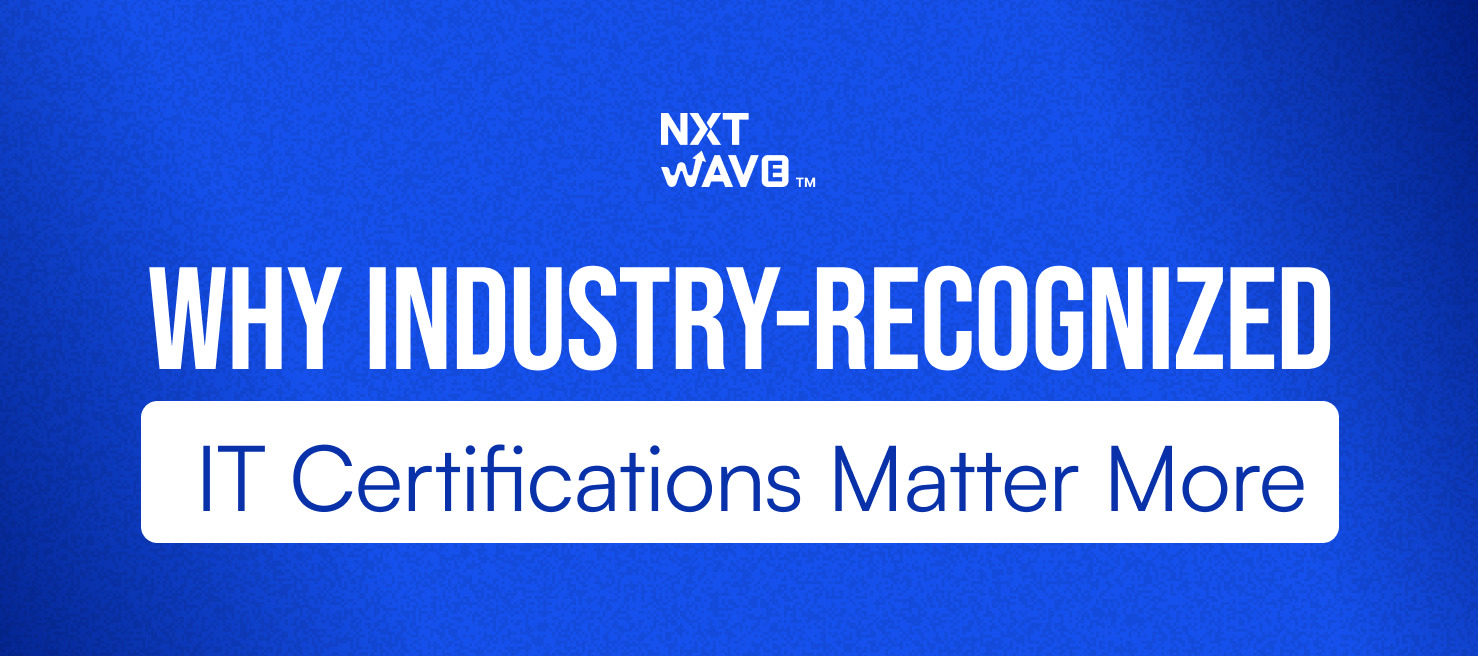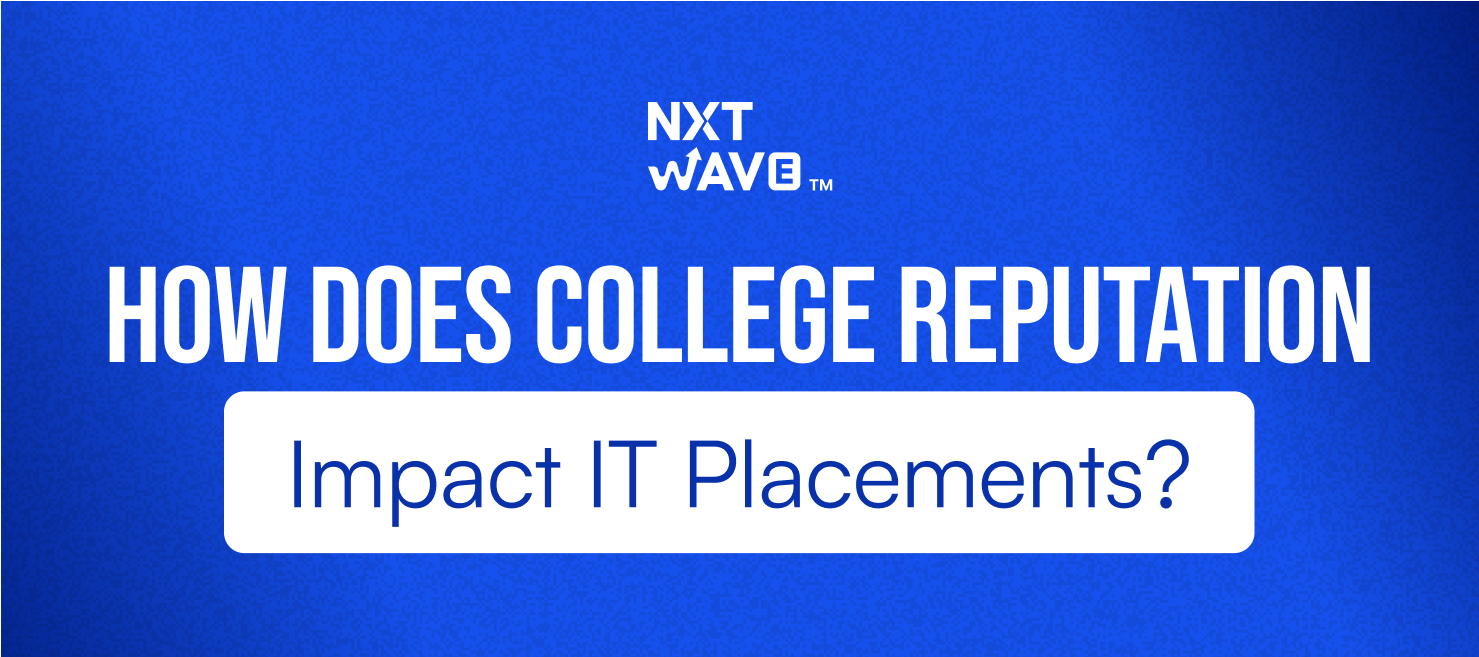Learning to code after the 3rd year of your B.Tech can feel difficult. Many students worry about starting late, catching up with others, and whether companies will give them a chance. It is normal to feel unsure if starting coding now is the right choice.
The good news is the tech industry is growing fast. According to the U.S. Bureau of Labor Statistics, software jobs will grow by 22% from 2020 to 2030. At the same time, 70% of hiring managers say it is hard to find people with good coding skills. This means there are many opportunities for students who want to learn, no matter when they start. What matters most is having a clear plan, staying focused, and practicing regularly.
Students who start coding late can still build good projects, learn problem-solving skills, and find tech jobs for freshers. Many students like you have done it and succeeded. This blog will help you understand how to choose which coding language is best for jobs, good learning resources, build a strong portfolio, and get internships or jobs even if you have a non-CS background. With the right guidance, effort, and perhaps a mentorship program for students, you can reach your tech career goals.
Transitioning from Non-CSE to an IT Career
Switching from a non-computer science (Non-CSE) background to a career in IT is not only possible, but increasingly common in job market. Many successful IT professionals come from fields as varied as mechanical engineering, electronics, civil, or even entirely non-technical streams. Here is a practical guide for students aiming to make this transition effectively:
Common Challenges
- Little or no coding experience
- Not much hands-on project experience
- Nervousness about competing with CS grads
- Unsure of where to start
Practical Solutions
- Identify Transferable Skills: Analytical reasoning, problem-solving, math, and team experience are all valuable in IT roles.
- Build Core Coding Skills: Focus on popular languages like Python, JavaScript, or Java. Start with beginner courses and work on hands-on exercises.
- Certifications: Complete well-known certifications (Google, AWS, Microsoft, etc.) to boost your profile.
- Develop a Portfolio: Create projects and upload them to GitHub. Document your journey to display growth.
- Join Communities: Network via LinkedIn, GitHub, Stack Overflow, and coding forums; consider open-source collaboration.
- Prepare for Interviews: Practice data structures, algorithms, and solve coding challenges on platforms like LeetCode and HackerRank. Attend mock interviews to build confidence.
Coding Languages to Learn in 2025
Here’s a list of in-demand languages that are widely used in the tech industry:
| Language |
Use Case |
| Python |
AI, Web Dev, Data Analysis |
| JavaScript |
Web Development, Full Stack |
| Java |
Android, Enterprise Software |
| SQL |
Databases, Data Analytics |
| C++ |
System Programming, CP, Game Dev |
| TypeScript |
Frontend Frameworks (Angular, etc.) |
Choosing which programming language is best for getting job depends on your career path, but Python is often considered the top choice due to its versatility in AI, web development, and data analytics.
The Best Resources to Start Coding
Finding the right resources is crucial. Try to find courses or platforms with a job guarantee course or pay after placement. Below are some of the most effective options such as:
1. Interactive Learning Platforms
Interactive learning platforms provide a hands-on approach to coding, allowing you to write and run code directly in your browser. This method helps you learn by doing, making it easier to grasp programming concepts quickly.
i) NxtWave CCBP 4.0
NxtWave CCBP 4.0 is specially designed for beginners and students without a computer science background. The program includes real-time projects, interview prep & job guarantee courses pay after placement, which is valuable for landing internships and jobs.
ii) Codecademy
Codecademy offers interactive coding lessons with instant feedback on your code. Its structured paths focus on languages like Python, JavaScript, and Java, making it a great starting point for learners new to programming.
iii) Coursera
Coursera features courses from top universities like Stanford and companies such as Google. Their courses combine lectures with graded assignments and projects to help you build a solid foundation in programming and computer science principles.
iv) Udemy
Udemy provides a wide range of affordable programming courses taught by industry professionals. You can learn at your own pace and access courses indefinitely, which is useful for revisiting topics when needed.
v) freeCodeCamp
freeCodeCamp is a free, project-based platform where you learn by building real-world projects. The courses cover web development deeply and provide certifications upon completion, backed by a supportive online community.
vi) HackerRank & LeetCode
These platforms are focused on coding challenges, algorithm practice, and interview prep. They are essential for anyone preparing for coding tests in tech interviews and help improve problem-solving skills.
2. YouTube Channels
YouTube channels are excellent for learners who prefer video tutorials and explanations. Many creators offer complete series tailored for beginners and advanced programmers.
i) Programming with Mosh
Offers clear, structured tutorials that cover major programming languages and frameworks. The content is beginner-friendly and thorough.
ii) CodeWithHarry (Hindi-friendly)
This channel provides programming tutorials in Hindi, making learning accessible for a large group of Indian students. It covers basics up to advanced topics with practical examples.
iii) Corey Schafer
Corey’s channel is known for detailed Python tutorials, as well as lessons on Git, SQL, and web development.
3. University and MOOC Platforms
MOOCs (Massive Open Online Courses) provide university-level education accessible to anyone online. These platforms allow you to gain fundamental knowledge while learning from renowned professors and industry experts.
i) edX
Known for courses like Harvard’s CS50, edX offers deep dives into programming basics, algorithms, and computer science concepts. You can audit courses for free or pay for certification.
ii) Google Digital Garage & Microsoft Learn
Both platforms provide beginner-friendly tutorials on programming, cloud services, and emerging tech. They emphasize practical skills aligned with industry needs.
4. Coding Communities and Forums
Communities and forums create a supportive environment where you can ask questions, share knowledge, and collaborate with other learners and professionals.
i) Stack Overflow
The go-to Q&A platform for programmers. You can find answers to nearly any coding problem and learn from experienced developers.
ii) Reddit: r/learnprogramming
A friendly subreddit dedicated to helping beginners with programming questions, resources, and advice.
iii) GitHub
Besides hosting repositories, GitHub is a hub for open-source projects. Contributing to projects helps you improve coding skills and gain practical experience.
5. Project and Portfolio Building
Building projects and hosting your code is critical to demonstrate your practical skills to potential employers.
i) GitHub
GitHub allows you to host your code publicly, maintain version control, and create a professional portfolio that hiring managers can review. It also encourages collaborative work with other developers.
ii) Replit
Replit is a cloud-based coding environment that enables quick prototyping and sharing of code snippets or full projects without the need to install software locally. It’s good for practicing, experimenting, and getting feedback.
Building a Coding Portfolio from Zero
Creating a strong coding portfolio is essential for anyone entering the tech field, especially if you’re starting late or transitioning from a non-traditional background. A coding portfolio not only showcases your technical abilities but also tracks your growth and problem-solving skills, impressing employers and opening opportunities for internships and jobs.
Why a Coding Portfolio is Important?
- Demonstrates Practical Ability: Projects show real-world application of what you’ve learned.
- Highlights Growth: A variety of projects illustrate your journey and increasing skill level.
- Boosts Employability: Recruiters prefer candidates with proof of actual work.
Steps to Build a Coding Portfolio
- Step 1: Begin with manageable, functional projects to gain confidence and hands-on experience.
- Step 2: Progress to more advanced or collaborative projects, including open-source contributions.
- Step 3: Use GitHub to manage code and showcase projects. Also, maintain a portfolio website summarizing your best work and learning milestones.
- Step 4: Continually refresh your portfolio with new, improved, or more challenging projects. Add certificates, coding contest badges, or notable GitHub contributions.
Sample Project Portfolio
| Project Type |
Example |
Skills Demonstrated |
| Personal Website |
Developer Portfolio |
HTML, CSS, JavaScript |
| Productivity App |
To-Do List, Notes App |
UI, logic, JavaScript/React |
| Small Game |
Tic-Tac-Toe, Number Guessing |
Logic, user interfaces |
| Data API Project |
Weather, Crypto Price Viewer |
API usage, data handling |
| Open Source |
Bug fixes, feature additions |
Version control, collaboration |
Essential Skills Beyond Coding
Success in tech requires more than just programming knowledge. Developing these essential skills will make you a well-rounded professional and boost your career prospects:
- Problem-Solving: Strong logical thinking and creativity are vital to break down complex challenges and find efficient solutions in real projects.
- Communication: Explaining your ideas clearly, documenting your code, and collaborating with others are valued abilities in team environments.
- Teamwork: Most software is built in teams; learning to work well with others, seek feedback, and handle disagreements is crucial.
- Time Management: Balancing multiple tasks, meeting deadlines, and organizing your learning path help you make consistent progress.
- Adaptability: The tech industry evolves fast; being open to new tools, languages, and ideas is key for long-term growth.
- Attention to Detail: Small mistakes can lead to bugs or errors. Developing thoroughness helps ensure your code works as expected.
Employers and teams look for candidates who combine technical ability with these professional and interpersonal skills.
How to Practice Coding Effectively?
Consistent and focused practice is the fastest route to mastering coding. Here are practical steps to maximize your progress:
- Set Clear, Achievable Goals: Break your learning into smaller daily or weekly milestones.
- Practice Regularly: Aim for short, daily sessions rather than long, infrequent ones.
- Use Coding Platforms: Use sites like HackerRank, LeetCode, and CodeChef for hands-on problem-solving and to build competitive skills.
- Build Real Projects: Apply your knowledge by creating applications, even simple ones. Projects show you how to integrate different concepts.
- Review and Refactor: Go back to old projects and improve your code. This builds better coding habits.
- Track Your Learning: Maintain a log of problems solved, projects completed, and areas needing improvement.
- Seek Feedback: Share your work with peers or mentors to catch mistakes and learn new techniques.
Do Internships Matter?
Internships offer crucial opportunities to translate learning into professional experience:
- Practical Skills: Apply your classroom and self-taught knowledge to real projects and company workflows.
- Networking: Work alongside experienced developers and build industry connections.
- Resume Strength: Internship experience is highly valued by recruiters and often leads to pre-placement offers.
- Mentorship: Learn best practices and receive feedback from industry professionals.
- Alternatives: If internships are difficult to get, consider open-source contributions, part-time freelance work, or volunteering in tech roles.
Internships bridge the gap between education and work, develop confidence, and can be a decisive factor in landing your first full-time job.
Networking in the Tech Industry
Networking is not just for job seeking; it's for learning, growing, and staying updated. Building and maintaining professional relationships opens up job opportunities and accelerates your tech career:
- Online Platforms: Use LinkedIn, GitHub, and Twitter to showcase your projects, join discussions, and connect with peers.
- Attend Events: Participate in local or virtual hackathons, developer meetups, seminars, and workshops to meet industry professionals.
- Community Involvement: Join forums like Stack Overflow, Reddit's r/learnprogramming, and coding club groups for support and advice.
- Seek Mentors: Connect with professionals for career guidance and project feedback.
- Benefits: Networking can lead to referrals, collaborations, and insights about the job market and industry trends.
Overcoming Challenges and Staying Motivated
Everyone faces obstacles during their coding journey, but with the right mindset and strategies, you can stay on track. Below are some crucial elements to sustaining your motivation and achieving long-term success:
- Expect Setbacks: Bugs, errors, and rejections are normal. Treat them as learning opportunities.
- Join Supportive Groups: Study in pairs, join online communities, or coding clubs to stay motivated and accountable.
- Set Realistic Goals: Breaking larger ambitions into smaller, achievable steps helps you progress quickly and celebrate each win.
- Track Progress: Keep a journal or checklist of your achievements and skills learned.
- Reward Yourself: Celebrate milestones and take breaks to avoid burnout.
- Growth Mindset: Focus on your progress. Every new skill, project, or fix is a step forward.
Conclusion
In conclusion, It is absolutely possible to learn coding after your 3rd year and still land a great tech job. Whether you're from a CS or non-CS background, companies care more about real skills, projects, and your problem-solving ability than when you started.
By choosing which coding language is best for jobs, practicing daily, and building a strong portfolio with real-time projects, you can beat the competition. Use job guarantee courses pay after placement, connect with mentors, and prepare smartly for interviews.
Frequently Asked Questions
1. Do Self-Taught Coders Get Hired?
Yes, self-taught coders are regularly hired across the tech industry. Employers often prioritize a demonstrated ability to solve problems, real project experience (shown on GitHub or other platforms), and solid performance in coding tests or interviews over formal education credentials. Self-learners succeed by following structured paths (MOOCs, bootcamps, online tutorials), actively building projects, and networking through tech communities.
2. Can I Learn Coding at 30 and Get a Job?
Yes, you can start learning coding at 30 and still get a job in tech. There are countless examples of people making successful career transitions later in life. Most employers care far more about your skills, portfolio, and willingness to learn than your age. The demand for developers remains strong, and mature beginners often bring valuable perspectives, discipline, and soft skills to teams.
3. Can I switch to coding from a non-CS branch?
Yes. Focus on which programming language is best for getting job, build projects, and prepare well for interviews.
4. Do grades or GPA matter if I have good projects?
For most entry-level tech roles, practical skills, coding profiles, and interview performance are more important than GPA or academic scores.
5. How important is competitive programming for getting a tech job?
Competitive programming strengthens problem-solving skills and helps in cracking coding interviews; however, combining it with project experience makes you more job-ready.




















